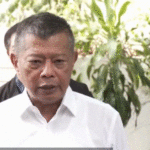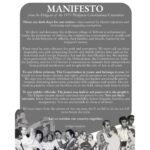The family and friends of a Filipino man arrested by US Immigration and Customs Enforcement (ICE) are seeking help, as he remains detained at the Stewart Detention Center in Georgia.
Border Patrol agents arrested Sonny Lasquite, a 44-year-old green card holder from Pampanga, at Charlotte International Airport in North Carolina on July 28, 2025.
According to a family friend, Lasquite had just returned from a vacation in the Bahamas when Customs and Border Protection (CBP) stopped him at the airport.
Another friend, also a green card holder, stated that both underwent secondary inspection.
After nearly an hour, the friend was released, but Lasquite was held due to a “red flag” in the CBP system.
Court records show that Lasquite was convicted on August 14, 2012, in the US District Court for the Southern District of New York for conspiracy to sell and possess Schedule IV controlled substances, as well as distributing alprazolam and zolpidem.
Documents revealed that Lasquite played a major role in dismantling the international operations of his associates. His cooperation with the US Attorney’s Office and federal agents led to the imprisonment of seven individuals, including the group’s leader.
As a result, the US Department of Justice recommended a sentence of zero to six months in exchange for his guilty plea.
In a 2014 letter, a former US Attorney stated in a sentencing memorandum that Lasquite’s role was crucial in stopping and holding accountable those involved in drug distribution.
“Lasquite provided substantial assistance to law enforcement by supplying information about other people, including those with whom he had conspired to violate federal law,” the document stated.
Lasquite was ultimately sentenced to “time served,” meaning no additional jail time, and was ordered to pay $200 in criminal monetary penalties.
Since then, Lasquite has had no involvement in illegal activities. He worked as a banquet server at a Las Vegas casino and supported his mother.
He has lived in the US for 23 years.
An immigration lawyer explained that while Lasquite’s cooperation with authorities was significant, it does not guarantee protection from deportation.
“His cooperation with US authorities is significant, but it doesn’t automatically stop deportation unless law enforcement steps in to sponsor a special visa or DHS uses prosecutorial discretion,” the lawyer said.
Due to the severity of his past conviction, Lasquite could be deported back to the Philippines.
“Sonny is in danger of deportation because, under US immigration law, any lawful permanent resident convicted of distributing controlled substances—even with a short sentence—can be removed from the country. His conviction counts as both a controlled substance offense and an aggravated felony, and it also involves moral turpitude since it’s a serious offense showing intent to break the law,” the lawyer explained.
Lasquite has limited options to prevent deportation.
“These grounds block most forms of relief, like asylum or cancellation of removal. There are still limited options. He could apply for withholding of removal or protection under the Convention Against Torture if he can prove serious danger in the Philippines. Another path is post-conviction relief, where the criminal conviction is overturned for legal reasons,” the lawyer added.
Lasquite’s family has reached out to representatives of the Philippine Embassy in Washington, DC, who are currently monitoring his case.
Stewart Detention Center
The Stewart Detention Center, located in Lumpkin, Georgia, is a privately operated immigration detention facility managed by CoreCivic. Opened in 2006, it primarily holds individuals detained by U.S. Immigration and Customs Enforcement (ICE) and has faced criticism over allegations of poor conditions and human rights violations. The facility plays a significant role in U.S. immigration enforcement but remains controversial due to reports of mistreatment and lack of transparency.
Charlotte International Airport
Charlotte Douglas International Airport (CLT) is a major aviation hub in North Carolina, USA, and one of the busiest airports in the world by passenger traffic. Originally established in 1935 as a small municipal airfield, it expanded significantly after becoming a hub for American Airlines in the 1980s. Today, it serves over 50 million passengers annually and is known for its efficient layout and regional economic importance.
US District Court for the Southern District of New York
The **U.S. District Court for the Southern District of New York (SDNY)** is one of the most prominent federal trial courts in the U.S., established in 1789 and covering Manhattan, the Bronx, and several nearby counties. Known as the “Mother Court,” it has handled many high-profile cases, including major financial crimes, terrorism trials, and civil rights lawsuits. Its historic courthouses, such as the Thurgood Marshall U.S. Courthouse in Foley Square, reflect its long-standing role in shaping American legal precedent.
Las Vegas casino
Las Vegas casinos are iconic entertainment hubs located in Las Vegas, Nevada, famously known as the “Entertainment Capital of the World.” The city’s casino culture began in the early 20th century, with legal gambling established in 1931, and flourished with the rise of lavish resorts like the Flamingo in the 1940s. Today, Las Vegas casinos are renowned for their luxury hotels, world-class shows, and vibrant nightlife, attracting millions of visitors annually.
Philippine Embassy
The Philippine Embassy serves as the official diplomatic mission of the Philippines in foreign countries, promoting bilateral relations, assisting overseas Filipinos, and providing consular services. Established in various host nations, these embassies reflect the Philippines’ diplomatic ties since gaining independence in 1946. Key functions include visa processing, cultural exchanges, and safeguarding the rights of Filipino citizens abroad.
Washington, DC
Washington, DC, the capital of the United States, was founded in 1790 as a planned city to serve as the nation’s political center. Named after George Washington, it houses iconic landmarks like the White House, Capitol, and National Mall, reflecting its deep historical and governmental significance. The city’s design, influenced by Pierre Charles L’Enfant, blends grand neoclassical architecture with monuments honoring American history and democracy.
Pampanga
Pampanga is a province in the Central Luzon region of the Philippines, known for its rich history, vibrant culture, and culinary heritage. It was established by the Spanish in 1571 and became a significant colonial hub, with its capital, Bacolor, once serving as the capital of the Philippines during the British occupation (1762–1764). Today, Pampanga is celebrated for its festivals, such as the Giant Lantern Festival, and its flavorful cuisine, including the famous dish sisig.
Bahamas
The Bahamas is a stunning archipelago in the Atlantic Ocean, consisting of over 700 islands and cays, known for their crystal-clear waters, vibrant coral reefs, and white sandy beaches. Originally inhabited by the Lucayan people, the islands were colonized by the British in the 17th century after Christopher Columbus’s first landing in the New World in 1492. Today, the Bahamas is an independent Commonwealth nation renowned for its tourism, rich maritime history, and unique blend of African, British, and Caribbean cultures.






